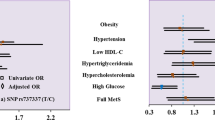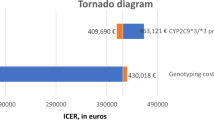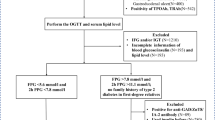Abstract
The aim of this study was to investigate the association of PAX4 variants with therapeutic effect of oral antidiabetic drugs in Chinese type 2 diabtes mellitus (T2DM) patients. A total of 209 newly diagnosed T2DM patients were randomly assigned to treatment with repaglinide or rosiglitazone for 48 weeks, and the therapeutic effects were compared. In the rosiglitazone cohort, rs6467136 GA+AA carriers showed greater decrease in 2-h glucose levels (P=0.0063) and higher cumulative attainment rates of target 2-h glucose levels (Plog rank=0.0093) than GG homozygotes. In the subgroup with defective β-cell function, rs6467136 GA+AA carriers exhibited greater decrements of 2-h glucose level and improvement of homeostasis model assessment of insulin resistance (P=0.0143). Moreover, GA+AA carriers were more likely to attain the target fasting and 2-h glucose level (Plog rank=0.0091 and 0.007, respectively). However, these single-nucleotide polymorphisms showed no effect on repaglinide efficacy. In conclusion, PAX4 variant rs6467136 was associated with the therapeutic effect of rosiglitazone in Chinese T2DM patients.
This is a preview of subscription content, access via your institution
Access options
Subscribe to this journal
Receive 6 print issues and online access
$259.00 per year
only $43.17 per issue
Buy this article
- Purchase on Springer Link
- Instant access to full article PDF
Prices may be subject to local taxes which are calculated during checkout


Similar content being viewed by others
References
Lang D, Powell SK, Plummer RS, Young KP, Ruggeri BA . PAX genes: roles in development, pathophysiology, and cancer. Biochem Pharmacol 2007; 73: 1–14.
Sosa-Pineda B, Chowdhury K, Torres M, Oliver G, Gruss P . The Pax4 gene is essential for differentiation of insulin-producing beta cells in the mammalian pancreas. Nature 1997; 386: 399–402.
Habener JF, Kemp DM, Thomas MK . Minireview: transcriptional regulation in pancreatic development. Endocrinology 2005; 146: 1025–1034.
Kooptiwut S, Plengvidhya N, Chukijrungroat T, Sujjitjoon J, Semprasert N, Furuta H et al. Defective PAX4 R192H transcriptional repressor activities associated with maturity onset diabetes of the young and early onset-age of type 2 diabetes. J Diabetes Compl 2012; 26: 343–347.
Tokuyama Y, Matsui K, Ishizuka T, Egashira T, Kanatsuka A . The Arg121Trp variant in PAX4 gene is associated with beta-cell dysfunction in Japanese subjects with type 2 diabetes mellitus. Meta Clin Exp 2006; 55: 213–216.
Shimajiri Y, Sanke T, Furuta H, Hanabusa T, Nakagawa T, Fujitani Y et al. A missense mutation of Pax4 gene (R121W) is associated with type 2 diabetes in Japanese. Diabetes 2001; 50: 2864–2869.
Plengvidhya N, Kooptiwut S, Songtawee N, Doi A, Furuta H, Nishi M et al. PAX4 mutations in Thais with maturity onset diabetes of the young. J Clin Endocrinol Metab 2007; 92: 2821–2826.
Biason-Lauber A, Boehm B, Lang-Muritano M, Gauthier BR, Brun T, Wollheim CB et al. Association of childhood type 1 diabetes mellitus with a variant of PAX4: possible link to beta cell regenerative capacity. Diabetologia 2005; 48: 900–905.
Mauvais-Jarvis F, Smith SB, Le May C, Leal SM, Gautier JF, Molokhia M et al. PAX4 gene variations predispose to ketosis-prone diabetes. Hum Mol Genet 2004; 13: 3151–3159.
Cho YS, Chen CH, Hu C, Long J, Ong RT, Sim X et al. Meta-analysis of genome-wide association studies identifies eight new loci for type 2 diabetes in east Asians. Nat Genet 2012; 44: 67–72.
Ma RC, Hu C, Tam CH, Zhang R, Kwan P, Leung TF et al. Genome-wide association study in a Chinese population identifies a susceptibility locus for type 2 diabetes at 7q32 near PAX4. Diabetologia 2013; 56: 1291–1305.
Wang J, Bao YQ, Hu C, Zhang R, Wang CR, Lu JX et al. Effects of ABCA1 variants on rosiglitazone monotherapy in newly diagnosed type 2 diabetes patients. Acta Pharmacol Sin 2008; 29: 252–258.
He YY, Zhang R, Shao XY, Hu C, Wang CR, Lu JX et al. Association of KCNJ11 and ABCC8 genetic polymorphisms with response to repaglinide in Chinese diabetic patients. Acta Pharmacol Sin 2008; 29: 983–989.
Yu WH, Hu C, Zhang R, Wang CR, Qin W, Lu JY et al. Effects of KCNQ1 polymorphisms on the therapeutic efficacy of oral antidiabetic drugs in Chinese patients with type 2 diabetes. Clin Pharmacol Ther 2011; 89: 437–442.
Bao YY, Jia WP, Gao X, Liu W, Xing HL, Liu ZM et al. Evaluation of insulin secretion and insulin sensitivity in the selection of hypoglycemic drugs—a multicentre clinical study. Chin J Endocrinol Metab 2007; 36: 104–109.
Matthews DR, Hosker JP, Rudenski AS, Naylor BA, Treacher DF, Turner RC . Homeostasis model assessment: insulin resistance and beta-cell function from fasting plasma glucose and insulin concentrations in man. Diabetologia 1985; 28: 412–419.
Elte JW, Blickle JF . Thiazolidinediones for the treatment of type 2 diabetes. Eur J Intern Med 2007; 18: 18–25.
Schoonjans K, Auwerx J . Thiazolidinediones: an update. Lancet 2000; 355: 1008–1010.
Noble J, Baerlocher MO, Silverberg J . Management of type 2 diabetes mellitus. Role of thiazolidinediones. Can Fam Physician 2005; 51: 683–687.
Lebovitz HE, Dole JF, Patwardhan R, Rappaport EB, Freed MI . Rosiglitazone monotherapy is effective in patients with type 2 diabetes. J Clin Endocrinol Metab 2001; 86: 280–288.
Deeks ED, Keam SJ . Rosiglitazone: a review of its use in type 2 diabetes mellitus. Drugs 2007; 67: 2747–2779.
Kim HS, Noh JH, Hong SH, Hwang YC, Yang TY, Lee MS et al. Rosiglitazone stimulates the release and synthesis of insulin by enhancing GLUT-2, glucokinase and BETA2/NeuroD expression. Biochem Biophys Res Commun 2008; 367: 623–629.
Moibi JA, Gupta D, Jetton TL, Peshavaria M, Desai R, Leahy JL . Peroxisome proliferator-activated receptor-gamma regulates expression of PDX-1 and NKX6.1 in INS-1 cells. Diabetes 2007; 56: 88–95.
Gupta D, Jetton TL, Mortensen RM, Duan SZ, Peshavaria M, Leahy JL . In vivo and in vitro studies of a functional peroxisome proliferator-activated receptor gamma response element in the mouse pdx-1 promoter. J Biol Chem 2008; 283: 32462–32470.
Acknowledgements
We thank all the patients who participated in this study and are appreciative of the doctors and nurses at the Shanghai Clinical Center for Diabetes. This project was funded by 973 Program (2011CB504001), grants from NSFC (81322010, 81170735 and 81200582), the Drug Innovation Program of the National Science and Technology Project (2011ZX09307-001-02), 863 Program (2012AA02A509), Excellent Young Medical Expert of Shanghai (XYQ2011041), Shanghai Talent Development Grant (2012041), Shanghai Raising Star Program (12QH1401700) and National Young Top Talent Supporting Program.
Author information
Authors and Affiliations
Corresponding author
Ethics declarations
Competing interests
The authors declare no conflict of interest.
Additional information
Supplementary Information accompanies the paper on the The Pharmacogenomics Journal website
Supplementary information
PowerPoint slides
Rights and permissions
About this article
Cite this article
Chen, M., Hu, C., Zhang, R. et al. Association of PAX4 genetic variants with oral antidiabetic drugs efficacy in Chinese type 2 diabetes patients. Pharmacogenomics J 14, 488–492 (2014). https://doi.org/10.1038/tpj.2014.18
Received:
Revised:
Accepted:
Published:
Issue Date:
DOI: https://doi.org/10.1038/tpj.2014.18



